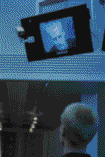 On the Web, you can see just about anything, and see it as quickly or
as slowly as you want. Of course, there are the back alley peep shows and
strip joints, but also the
feet of your co-workers,
toilets, and
chia pets.
On the Web, you can see just about anything, and see it as quickly or
as slowly as you want. Of course, there are the back alley peep shows and
strip joints, but also the
feet of your co-workers,
toilets, and
chia pets.
On one level it's all about voyeurism, but simulated voyeurism--being allowed
to watch, but without the danger, or thrill, of being caught . Sure the site might be intelligent enough to
know you're there, but you're likely to not end up in a courtroom somewhere.
On another level, though, it's about one definition of authorship,
about constructing meaning out of the images that make up the lives of our
virtual neighbors. They provide the images, you provide the text (or a collection
of images, or an ordering of images to provide meaning). It's not exactly
turtles all the way down, but images and meaning as far down as we care
to descend.
Plagiarism? Hardly as long as you give
credit to the original source or
don't unfairly try to take credit, through profit, or otherwise, for someone
else's work. The debate arises here, though as parties
contend for the right to
exclusive authorship. The optimistic side of surveillance
on the net is that it extends our abilities out to include new perspectives.
The flip side, however, revolves around issues of ownership and authorship...how
the technology might be used for yet other means.




